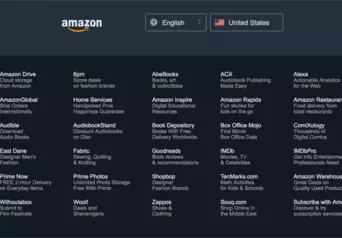Small Business Advocacy Econ 101 (or terms Amazon would rather you didn’t know)
Amazon is using predatory pricing and other tactics to gain a monopoly in the retail industry. And it's clear that this is hurting small businesses and local economies.

- Post Date
- Wed, May 2
- Small Business Advocacy
Even if you’ve never taken an economics class, you’ve definitely heard and seen the terms tax avoidance, antitrust, and monopoly thrown around on the news or in headlines on social media. What you may not have thought about is that these are all intrinsic to Amazon’s business model, whether in their startup phase, their present growth phase, or their future expansion phase.
Tax Avoidance as defined by The Economist means doing everything possible within the law to reduce your tax bill. Not only does Amazon – who reported approximately $5.6 billion in profits in 2017 – not pay any federal taxes, and are courted by United States communities to set up warehouses and headquarters with tax breaks and other incentives, but also and perhaps worse they successfully exploited state sales tax loopholes and avoided paying sales tax for decades. Because there was effectively no way for states to collect sales tax from ecommerce companies, Amazon was until recently (and still is in some cases) able to present a lower cost to the consumer by not charging any tax.
Why does this matter? This abuse of the tax system puts brick-and-mortar retail stores at a distinct competitive disadvantage (so much for the free market). In addition, States lost a huge amount of tax dollars to Amazon sales, which could lead to higher income or property taxes, in order for them to meet their budget needs.
The Economist defines Antitrust laws as those that aim to stop abuses of market power by big companies and, sometimes, to prevent corporate mergers and acquisitions that would create or strengthen a monopolist. In the end nineteenth century US antitrust laws were created in order to limit the control the railroads had over commerce; companies were broken up in order to reduce their economic and political power. However in the 1970s and 1980s enforcement of antitrust laws focused on those cases where a lack of competition harmed consumers, the most obvious “harm” being high prices.
According to Lina Khan, Director of Legal Policy from Open Markets Institute says that online platforms like Google, Facebook, and yes, Amazon, require a new approach for antitrust laws. “Although Amazon has clocked staggering growth, it generates meager profits, choosing to price below-cost and expand widely instead. Through this strategy, the company has positioned itself at the center of e-commerce and now serves as essential infrastructure for a host of other businesses that depend upon it. Elements of the firm’s structure and conduct pose anticompetitive concerns—yet it has escaped antitrust scrutiny.” In addition, their recent acquisition of Whole Foods is one step closer to being able to shut out or disfavor rival grocers and food delivery services.
Why do we care that current antitrust law enforcement focuses not on the size and scope of a business? Because Amazon has already begun to acquire exceptional control over commerce. How many consumers simply go to the search bar in Amazon to find a product they want or need to purchase? Amazon dictates the results you see, and captures data about the purchaser while doing so. They have also begun to produce themselves a large percentage of the products for which consumers are looking. They are also a logistics network, a marketing tool, a television network and a cloud computing service, among other things. The size and scope of this is borderline scary and definitely harmful to local economies (more on that next month).
So, what happens when antitrust laws are not enforced? Monopolies: when the production of a good or service with no close substitutes is carried out by a single firm with the market power to decide the price of its output. A key indicator of the existence of a monopoly is predatory pricing. Would-be monopolists sell items at a lower cost to drive out competitors, and then raise prices when consumers perceive they have no other choice. Amazon is in the process of doing just that. They started with low prices on their products and services to gain customer loyalty, next attracted other sellers to their site where all of their millions of loyal consumers were shopping, then they began producing products that they deemed were popular and selling them at a lower price, and eked out the competition, thus becoming the only competitive seller of so many of their offerings.
We’ve already evidenced that Amazon is no longer offering the cheapest prices to shoppers, but they continue to grow their market share every single day.
What’s the big deal if there are monopolies in our economy? They can fix prices and hurt a segment of the population, they discourage innovation, can supply inferior products, and cause inflation. What’s more, a retail monopoly like the one Amazon is hoping to master, will kill local economies just like Cape Cod.
Related articles
- Post Date
- Sat, Aug 31
- Small Business Advocacy
- Post Date
- Wed, Aug 21
- Small Business Advocacy

